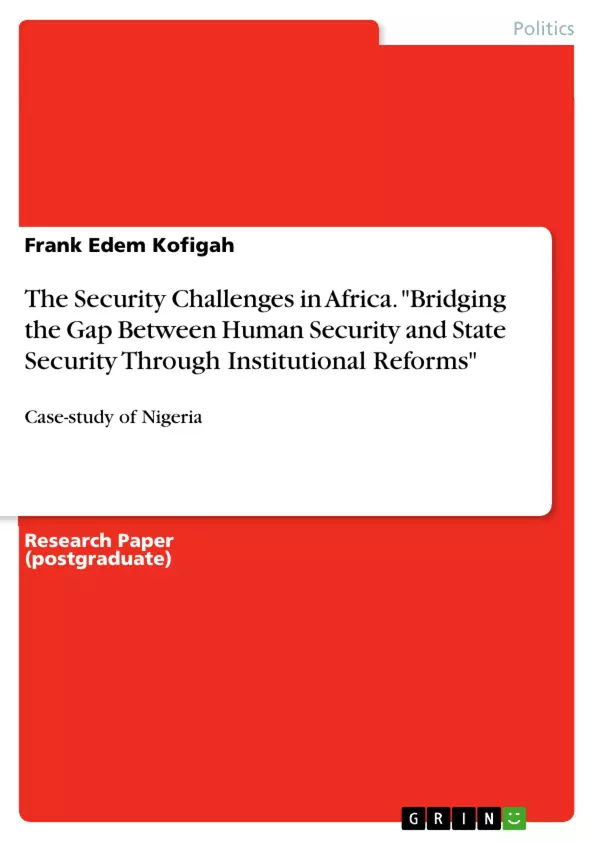This paper seeks to show that institutional reforms are urgently needed in the area of security (physical security, human security & state security) especially as the general idea that the inability of most African states during their developmental stage to ensure national cohesion, as relevant as it might seem, is being overtaken by other emerging factors notably their inability to control boundaries and provide their citizens’ right to life of which freedom is a very important component.
These perceived weaknesses of most States in Africa epitomize the concept of failed states. This paper proposes a merger between human security and state security as the contemporary security breaches are multidimensional and in a State’s bid to adequately roll out measures to tackle the latter, it is only rational that the situation will be analyzed holistically.
To address this issue our article adopted the following problematic: «What could be done to ensure that the culture of peace, conflict prevention and resolution in the wake of the numerous security challenges lead to development and by extension sustainable development?»
Inhaltsverzeichnis (Table of Contents)
- Introduction
- I. The concept of state security in review with respect to the security situation in certain African States:
- II. The concept of human security in review with respect to the security situation in certain African States
Zielsetzung und Themenschwerpunkte (Objectives and Key Themes)
This paper aims to demonstrate the urgent need for institutional reforms in the area of security, encompassing physical security, human security, and state security. It argues that the inability of African states to ensure national cohesion and control boundaries is exacerbated by their failure to provide their citizens with basic rights, including the right to life and freedom. This paper proposes a holistic approach to security, merging human security and state security, recognizing the multidimensional nature of contemporary security threats. To address the security challenges in Africa, it proposes a three-pronged solution: consolidating institutions responsible for state building, promoting the state's role in poverty reduction, and empowering local actors in decision-making processes.
- Institutional reforms for security enhancement
- The interconnectedness of human security and state security
- Failed states and the lack of national cohesion in Africa
- The role of poverty and bad governance in security threats
- The importance of local actors and their participation in decision-making
Zusammenfassung der Kapitel (Chapter Summaries)
The first chapter examines the concept of state security, focusing on the challenges faced by certain African states in ensuring both state security and human security. It highlights the fragility of these states, particularly in the context of porous borders, internal conflicts, and the rise of separatist movements. The chapter discusses the failure of these states to provide basic necessities and protect their citizens' rights, leading to a multidimensional deprivation of their populations.
The second chapter delves into the concept of human security, exploring its relationship to state security and the challenges it presents in ensuring physical security for the population. It examines the role of poverty and bad governance in exacerbating security threats and highlights the importance of addressing these issues to achieve sustainable development.
Schlüsselwörter (Keywords)
The key themes and concepts explored in this paper include human security, state security, governance, development, freedom, institutions, failed states, sustainable development, and reforms. It examines the relationship between these concepts and their implications for security in Africa, particularly in the context of the case study of Nigeria.
Frequently Asked Questions
What is the difference between human security and state security?
State security focuses on the protection of borders and sovereignty, while human security prioritizes the protection of individuals' rights, freedom, and well-being from threats like poverty and violence.
Why is institutional reform urgent for security in Africa?
Reforms are needed because many African states struggle with porous borders, internal conflicts, and the inability to provide basic rights, which often leads to the "failed state" phenomenon.
How does poverty contribute to security threats?
Poverty and economic deprivation create social unrest and make populations more vulnerable to radicalization and conflict, undermining both human and state security.
What is a "failed state" in the African context?
A failed state is characterized by the government's inability to ensure national cohesion, control its territory, or protect the fundamental rights and lives of its citizens.
What are the proposed solutions for sustainable development and peace?
The paper proposes consolidating state-building institutions, promoting poverty reduction, and empowering local actors in decision-making processes to foster a culture of peace.
- Quote paper
- Frank Edem Kofigah (Author), 2015, The Security Challenges in Africa. "Bridging the Gap Between Human Security and State Security Through Institutional Reforms", Munich, GRIN Verlag, https://www.grin.com/document/298458



